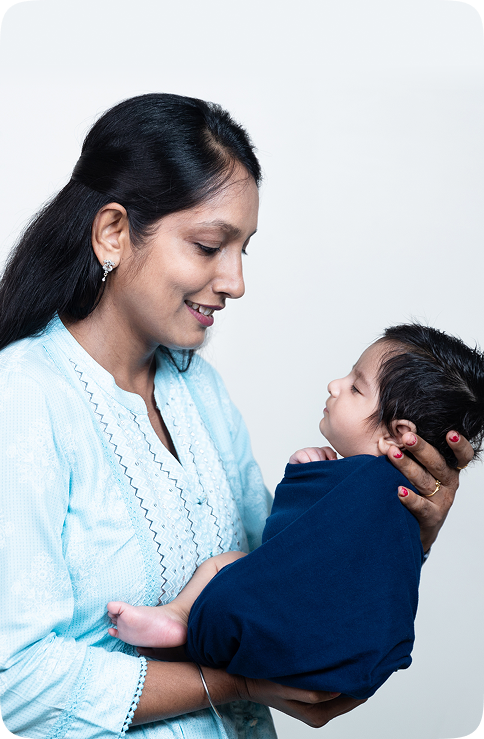We made a lot of efforts researching the Top-Rated IVF Clinics in Gurgaon. Based on our personal experience, I way say that Little Angel IVF’s Gurgaon branch is excellent! Their staff is very supportive and the facility is world-class. They were going through some construction work for some time but I guess they must be ready. Either way, the best way is to book an appointment with Dr Mona Dahiya as she visits very prominent fertility centres in Gurgaon like Birla Fertility & IVF.
Our Achievemets
What is IVF?
Parenthood is a dream that many cherish, but for some, conceiving naturally can be a challenging journey. In such cases, In Vitro Fertilization (IVF) comes as a ray of hope. IVF is an assisted reproductive technology that helps couples overcome fertility issues and fulfill their dreams of having a baby. This revolutionary procedure involves the fertilization of an egg with sperm in a laboratory, followed by the transfer of the resulting embryo into the woman’s uterus.

Why Choose Little Angel IVF
Why You Should Choose IVF?
Embarking on the IVF journey can be a life-changing decision, and understanding its benefits is crucial. IVF offers a glimmer of hope to couples struggling with infertility, including those with blocked fallopian tubes, low sperm count, endometriosis, or unexplained infertility. By choosing IVF, you open doors to a higher chance of conceiving, even in the face of challenging circumstances. It provides an opportunity to experience the joys of parenthood, where traditional methods might have fallen short.

How IVF Treatment is Done?
IVF treatment involves several stages that require careful consideration and medical expertise. The process typically starts with ovarian stimulation, where medications are used to encourage the production of multiple eggs. These eggs are then retrieved through a minor surgical procedure. In the laboratory, the eggs are fertilized with sperm, either through traditional IVF or intracytoplasmic sperm injection (ICSI). The resulting embryos are cultured and monitored for a few days before being transferred into the woman’s uterus. This delicate procedure aims to provide the ideal conditions for embryo implantation and subsequent pregnancy.
How Soon Can You Expect Results After IVF Treatment?
After undergoing the IVF treatment, the question that lingers in the minds of hopeful couples is when they can expect results. While every individual case is unique, it’s important to understand that pregnancy may not occur immediately after the procedure. It often takes around two weeks to determine whether the IVF cycle was successful through a pregnancy test. However, it’s essential to embrace patience and maintain hope, as the outcome of IVF can be truly life-changing.
Benefits of IVF Treatment
IVF treatment brings forth numerous benefits for couples struggling with infertility. Let’s explore some of the key advantages:
- Increased Pregnancy Success Rates: IVF offers higher pregnancy success rates compared to other fertility treatments, providing renewed hope for couples who have been unsuccessful with alternative methods.
- Addressing Male Infertility Issues: IVF allows for the selection of high-quality sperm through procedures like ICSI, effectively addressing male infertility issues and increasing the chances of successful fertilization.
- Genetic Screening and Diagnosis: IVF enables preimplantation genetic screening (PGS) and preimplantation genetic diagnosis (PGD), allowing couples to screen embryos for genetic abnormalities or inheritable diseases, thereby reducing the risk of passing them on to the next generation.
- Preserving Fertility: For individuals or couples facing medical treatments that may affect fertility, IVF offers the option to preserve eggs or embryos for future use, preserving their chances of parenthood.
Risks of IVF Treatment
While IVF treatment holds immense promise, it’s important to be aware of the potential risks and challenges involved. Here are some considerations:
- Multiple Births: One of the primary risks associated with IVF is the possibility of multiple pregnancies. The use of multiple embryos to increase the chances of success can result in twins, triplets, or higher-order multiple pregnancies. While the joy of multiple births is undeniable, it also poses increased health risks for both the mother and the babies.
- Ovarian Hyperstimulation Syndrome (OHSS): The process of ovarian stimulation to produce multiple eggs carries the risk of OHSS. This condition occurs when the ovaries become swollen and painful, leading to abdominal discomfort, bloating, and fluid accumulation. Severe cases may require medical intervention and close monitoring.
- Emotional and Financial Stress: Undergoing IVF treatment can be emotionally and financially demanding. The rollercoaster of hope and disappointment, coupled with the financial burden of multiple cycles, can take a toll on couples. It’s important to have a strong support system in place and to consider the emotional and financial aspects before embarking on the IVF journey.
- Increased Risk of Ectopic Pregnancy IVF increases the risk of ectopic pregnancy, where the fertilized embryo implants outside the uterus, usually in the fallopian tubes. Ectopic pregnancies can be dangerous and require immediate medical attention.
Cost of IVF Treatment In Gurgaon
IVF is a more cost-effective option compared to many other countries. The cost of IVF can vary depending on factors such as the clinic, location, and specific treatment requirements. On average, the cost of a single IVF cycle in Gurgaon ranges from INR 1,50,000 to INR 2,50,000 at little angel IVF centre in Gurgaon. This includes the costs of consultations, medications, laboratory procedures, and embryo transfer. It’s important to note that additional procedures or treatments, such as genetic testing or frozen embryo transfer, may incur additional costs.
Success Rate of IVF Treatment In Gurgaon
The success rate of IVF treatment varies depending on several factors, including the age of the woman, the quality of the embryos, and the underlying causes of infertility. On average, the success rate for IVF in Gurgaon ranges from 60% to 80% per cycle at little angel IVF centre in Gurgaon. However, it’s crucial to remember that success rates can vary widely, and individual circumstances play a significant role. Working closely with experienced fertility specialists and maintaining a positive mindset can greatly increase the chances of a successful outcome.
About Little Angel IVF
Little Angel IVF Centre is a renowned fertility clinic that has established itself as a leader in providing exceptional care and support to couples struggling with infertility. Situated in a state-of-the-art facility, the centre has brought hope to numerous families by offering a comprehensive range of infertility treatments and services.
The highly skilled team at Little Angel IVF Centre consists of dedicated professionals, including experienced fertility specialists, embryologists, andrologists, and nursing staff. They work tirelessly to ensure that each patient receives personalized care tailored to their unique needs, using advanced technologies and evidence-based practices.
One of the key strengths of Little Angel IVF Centre is its commitment to using cutting-edge procedures and techniques. From in-vitro fertilization (IVF) and intracytoplasmic sperm injection (ICSI) to preimplantation genetic testing (PGT) and fertility preservation, the centre offers a diverse array of treatments to help couples achieve their dream of parenthood.

How is IVF Treatment in Gurgaon Performed at Little Angel IVF?
IVF, or in vitro fertilization, is a widely recognized and successful fertility treatment. It involves combining eggs and sperm outside the body in a laboratory dish. The resulting embryos are then transferred to the woman’s uterus, increasing the chances of a successful pregnancy.
The IVF Treatment Process
- Initial Consultation: Your journey with Little Angel IVF begins with an initial consultation. Our experienced fertility specialists will assess your medical history, perform necessary tests, and create a personalized treatment plan tailored to your specific needs.
- Ovarian Stimulation: To enhance the chances of successful fertilization, ovarian stimulation is administered. Medications are prescribed to stimulate the ovaries, enabling them to produce multiple eggs instead of the usual one egg per menstrual cycle.
- Egg Retrieval: Once the eggs are mature, a minor surgical procedure called egg retrieval is performed. This procedure is carried out under sedation to ensure your comfort. Our skilled doctors use specialized ultrasound-guided techniques to collect the eggs from the ovaries.
- Sperm Collection and Fertilization: On the same day as egg retrieval, the male partner provides a semen sample. The sperm is then prepared in the laboratory, and the most active and healthy sperm are selected for fertilization. The chosen sperm is combined with the eggs in a controlled environment to allow fertilization to occur naturally.
- Embryo Development and Transfer: After fertilization, the embryos are monitored closely in the laboratory for several days. The best-quality embryos are selected for transfer to the woman’s uterus. This process is performed with the help of a thin catheter inserted through the cervix. It is a quick and painless procedure that does not require anesthesia.
- Supportive Medications and Pregnancy Test: To support the implantation process, our doctors may prescribe certain medications. Approximately two weeks after the embryo transfer, a pregnancy test is conducted to determine the success of the treatment.
Best Clinic for IVF Treatment in Gurgaon
At Little Angel IVF, we pride ourselves on being the best clinic for IVF treatment. Here’s why you should choose us for your fertility journey:
- State-of-the-Art Facilities: Our clinic is equipped with the latest medical technology and advanced laboratory infrastructure. We ensure a clean and safe environment for all procedures.
- Expert Team of Fertility Specialists: Our team consists of highly skilled fertility specialists who have extensive experience in the field of reproductive medicine. They are dedicated to providing personalized care and support throughout your treatment.
- Individualized Treatment Plans: We understand that every patient is unique, and so are their fertility needs. At Little Angel IVF, we develop customized treatment plans tailored to your specific circumstances, increasing the chances of a successful outcome.
- Emotional Support: We acknowledge the emotional rollercoaster that infertility can bring. Our compassionate staff provides emotional support, guidance, and counseling to help you navigate through the highs and lows of your fertility journey.
- Success Rates: Little Angel IVF has achieved exceptional success rates in IVF treatments. Our commitment to excellence and continuous improvement ensures that we consistently deliver positive results to our patients.
- Holistic Approach: We believe in a holistic approach to fertility treatment. Along with IVF, we offer a range of complementary services such as acupuncture, nutritional counseling, and stress reduction techniques. These additional therapies can enhance your overall well-being and optimize your chances of success.
- Patient-Centric Care: At Little Angel IVF, you are at the center of everything we do. We prioritize your comfort, convenience, and satisfaction. Our friendly staff will guide you through every step of the process, ensuring that you feel supported and well-informed at all times.
Get IVF Treatment in Gurgaon at the Best IVF Centre in Gurgaon
If you’re seeking the best IVF center in Gurgaon, look no further than Little Angel IVF. Our commitment to excellence, personalized care, and exceptional success rates set us apart from the rest. With us, you can experience a transformative journey toward parenthood.
We understand that infertility can be emotionally challenging, but you are not alone. Our team of dedicated professionals is here to provide you with the support and expertise you need. We combine advanced medical techniques with a compassionate approach to give you the best chance of success.
Choosing the right fertility clinic is a crucial decision, and we assure you that Little Angel IVF is the best choice for your IVF treatment. Our state-of-the-art facilities, experienced team, individualized treatment plans, emotional support, and outstanding success rates make us a leader in the field.



